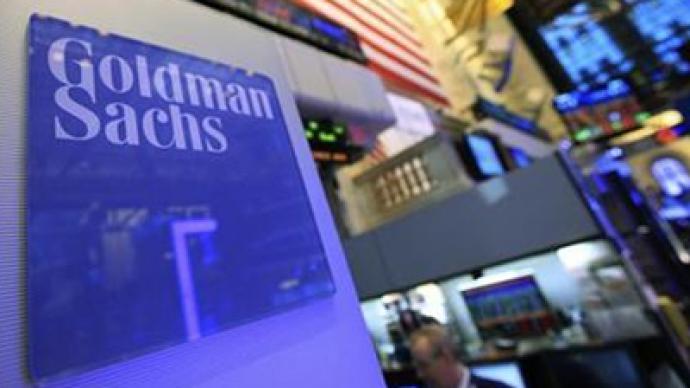Goldman Sachs exec leaves sinking ship in disgust

One of the most notorious Wall Street firms that became a symbol of corporate greed and disdain to its own clients in the wake of the 2008 financial crisis is in hot water again. This time it’s after a Goldman Sachs top executive resigned in disgust.
In a bombastic editorial published in The New York Times on Wednesday, an outgoing executive from Goldman Sachs blasts the investment bank as a heartless company that he says thrives in a culture he calls both “toxic” and “destructive.” Greg Smith, most recently a top exec at the London office of Goldman Sachs, writes in the Times on Wednesday that moral corruption behind the scenes of the legendary Wall Street institute came close to causing the collapse of the firm over nearly a century and a half. Having spent nearly 12 years himself working in both the US and abroad from the firm, Smith says the deterioration of the financial sector was easily noticeable along the way, and he blames it on the mismanagement and moral decay continuing to eat away at what’s within the firm’s walls. Smith cautions that, should Goldman continue on the path it is currently on, their future will once without a doubt be threatened once again.“I believe I have worked here long enough to understand the trajectory of its culture, its people and its identity,” Smith writes in the op-ed, “And I can honestly say that the environment now is as toxic and destructive as I have ever seen it.”For two pages, Smith dives into how from inside the company he managed to view first-hand the ways higher-ups grew to dissociate themselves from clients and put profits over people. From within the firm, Smith says the well-being of the company’s clients was as good as forgotten and that he quickly learned there that, more or less, cheating clients was key to climbing the top of the corporate ladder. “Today, many of these leaders display a Goldman Sachs culture quotient of exactly zero percent,” writes Smith. “I attend derivatives sales meetings where not one single minute is spent asking questions about how we can help clients. It’s purely about how we can make the most possible money off of them. If you were an alien from Mars and sat in on one of these meetings, you would believe that a client’s success or progress was not part of the thought process at all.”Smith adds, “Over the last 12 months I have seen five different managing directors refer to their own clients as ‘muppets,’ sometimes over internal e-mail.”Within hours of Wednesday’s edition being published on paper and online, Smith’s snarky send-off has already gone viral. Nelson Schwartz of the Times writes a response of his own in Wednesday in which he celebrates Smith’s “flair” and says that the soon-to-be former-Goldman top-gun “is saying publicly what others whisper privately, which is why his cri de coeur may be so provocative.”“Even on Wall Street — where making money is good, and making more money is better — a few shibboleths still command respect, including the one that the customer should come first, or at least second, not dead last,” Schwartz responds to Smith’s claims. Max Keiser, the host of RT's Keiser Report calls Smith's diatribe an "embarrassing confession of the firm's wrong doings" and asks, "Will Goldman destroy another European country with Credit Default Swaps like they did Greece? Will they bankrupt another municipality in America with exploding debt obligations?"Goldman Sachs have offered a rebuttal of their own since the editorial was published, telling the Times, “We disagree with the views expressed, which we don’t think reflect the way we run our business.”“In our view, we will only be successful if our clients are successful. This fundamental truth lies at the heart of how we conduct ourselves,” explains a Goldman spokesperson. Smith seems to think otherwise, however, and Schwartz cautions that his openness could once again cause Wall Street to teeter.“Mr. Smith’s criticism, much more than stories about bonuses or brickbats from the likes of Occupy Wall Street, could be especially painful for Wall Street now,” writes Schwartz. “Memories are still fresh of the Securities and Exchange Commission lawsuit filed in April 2010 accusing Goldman of fraud, after it sold clients complicated mortgage backed securities that later soured, and never mentioned that it had bet against them.”Smith himself explains, “If clients don’t trust you they will eventually stop doing business with you. It doesn’t matter how smart you are,” and suggests that others could learn from his editorial. “I hope this can be a wake-up call to the board of directors. Make the client the focal point of your business again. Without clients you will not make money. In fact, you will not exist,” he suggests. “People who care only about making money will not sustain this firm — or the trust of its clients — for very much longer.”















